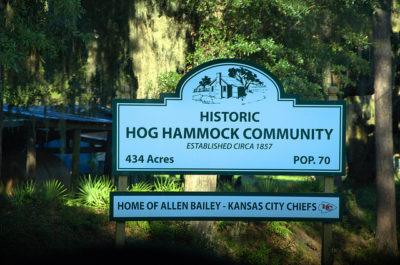|
Listen To The Article
|
Inhabitants on a series of remote islands in Georgia are feeling taxed enough already.
Sapelo Island is one of the few existing areas of the Gullah-Geechee culture in the United States, and the slave descendants who have called the beautiful remote area home for decades are battling for survival. Steep tax increases without any benefit of added services are threatening the sustainable lifestyle of the islanders.
Gullah-Geechee residents this year have seen their tax bills increase from roughly $800 per year to more than $3,000. The mostly low income residents who live on Sapelo Island did not really receive any benefits before the tax hike, and it does not appear than any new benefits will be rolling down the pike either.
The Georgia islands do not boast any government funded schools, police departments, fire houses, or road services. Much like many Americans, Tea Party members in particular, the largely off-the-grid Gullah-Geechee residents are asking, “What are we paying taxes for?”
The island is only reachable by boat and has been owned by the state of Georgia since 1976. The 30-square-mile area is primarily encompassed by virgin wilderness. Dirt roads connect the community of Hog Hammock with other areas of the island. The Gullah-Geechee area of Georgia is comprised of scattered small islands over 425 miles along the Atlantic Coast. Island residents craft many of their own tools, they use cast-net fishing to garner food and weave their own baskets by hands to store their minimal possessions.
Outspoken critics of the tax hikes believe that the increase violates government protections designed to preserve the Gullah-Geechee culture and the homes of the low-income Sapelo Island inhabitants. The area is south of Savannah.
A Call To Action For Those Who Care About The Future Of The United States.
Most of the remote Georgia islanders live in a community dubbed Hog Hammock. The majority of residents in the very small community are descendants of about 385 slaves who once worked tirelessly on the rice plantation of Thomas Spalding during the 1850s. After the slaves were freed during the Civil War, many opted to stay on the island and purchased land, which has remained in the hands of their families ever since.
But skyrocketing real estate appraisals accompanied by increased taxes may force the Gullah-Geechee residents out of their modest homes. Wealthy individuals eager to snag prime beachfront property are driving up taxes so high that the residents may soon find themselves in foreclosure.
The tax fight by the Sapelo Island residents has garnered international headlines, drawing attention once again to the ever-increasing intrusion by the government into both our lives and our pocketbooks. The islanders continue to appeal the real estate appraisals, but to no avail.
A handful of Hog Hammock property owners unable to maintain a sustainable existence on the island sold their homes in 2010. Some of their half-acre properties sold for as much as $165,500 to affluent buyers who wanted a vacation home, according to Yahoo News. McIntosh County, Georgia real estate appraisers claim they are only valuing homes in a consistent manner with market demand – but such comments are of little comfort to the islanders. A one-acre tract of vacant land appraised at $10,000 just two years ago recently sold for $181,250.
Washington-based attorney Reed Colfax is representing 28 property owners from the Hog Hammock community. Colfax filed a housing discrimination complaint against both McIntosh County and the US Department of Housing and Urban Development over the allegedly unjust tax increases. The attorney believes that the ballooning real estate appraisals violate a 1994 McIntosh County ordinance that designated Hog Hammock as a “special zoning district.”
The official designation was reportedly drafted in order to prevent property value increases that would force the removal of the residents from their isolated homes. When arguing against the increase property taxes Colfax said, “They can’t afford it. They’re going to be forced off the island in direct contradiction to the ordinance.”
How do you feel about the Gullah-Geechee residents potentially losing their homes because of high taxes?
 Off The Grid News Better Ideas For Off The Grid Living
Off The Grid News Better Ideas For Off The Grid Living




